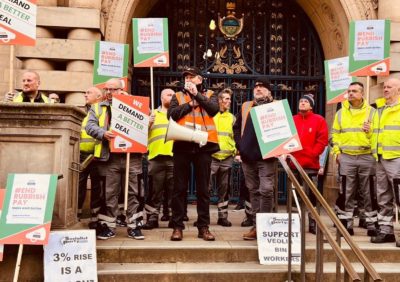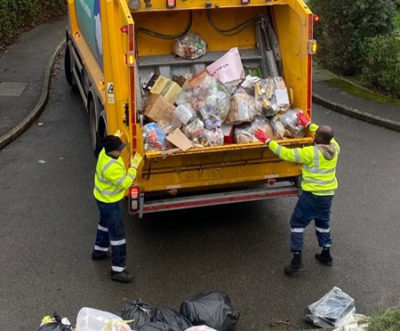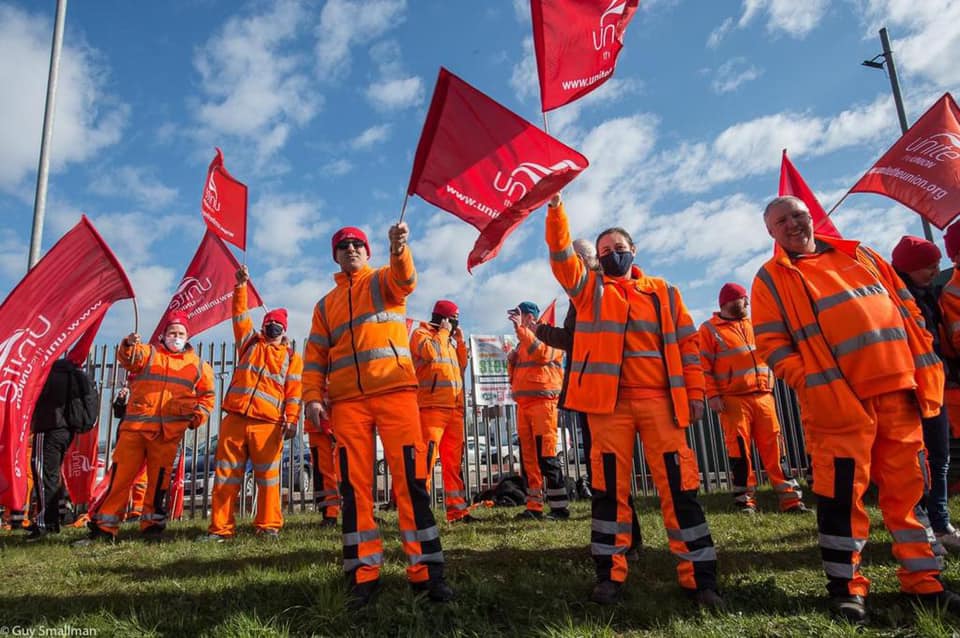However, some local authority bodies say councils “have their hands tied” in many cases, while representatives from the private sector say margins on collection contracts are small, meaning inflation-busting rises are difficult.
In recent weeks, there have been strikes by workers who are members of the trade union GMB in Glasgow, Brighton, Derbyshire Dales, Sheffield and Sandwell, to name a few. Long-term action has also been going on in Bexley.
Currently, crews in Coventry and Eastbourne are on strike over pay and conditions.
GMB says a pay rise for all refuse workers is “long overdue”, and the importance of the role during the pandemic has should have made councils realise this.
While the union has not undertaken “a coordinated approach” to target the waste and recycling sector, it believes recent strikes are an example of refuse crews “realising their worth and flexing their industrial muscle”.
Pay
According to statistics from the Office for National Statistics, the average salary for a refuse collection driver in the UK is £24,713. This rises to around £26,000 in London.

For crew members, this falls to an average of £20,261, and £22,788 in London.
Amid the tit-for-tat exchange surrounding the current strike in Coventry, GMB described refuse workers’ £22,000 salary as “poverty pay”.
Speaking with letsrecycle.com, Andy Prendergast, national secretary for GMB, said: “Pay for refuse workers has not been keeping up with inflation for a number of years now.
“We saw during the pandemic the heightened importance of the sector, and we think that needs to be reflected in significantly better pay conditions.
“Refuse crew workers are now realising their worth, having seen some of the higher paid roles elsewhere.
“From our point of view, refuse crews are underpaid and are an essential service. Councils and waste management companies have to realise this.”
‘Practically impossible’
Despite the risk of strike action, some with close links to local government warn that large pay rises would be “practically impossible” in most scenarios.

Given the sensitivity of the issue, letsrecycle.com spoke to individuals with connections to local authorities on an anonymous basis.
Festering
One spokesperson said council pay remained a “festering issue”, with many frontline workers bearing the brunt of inflationary pressures.
They explained: “Coupled with the impact of Covid-19, which recast the whole question of who we regard as ‘key workers’, it is unsurprising that we are now seeing these pockets of dispute across the waste and recycling sector.”
However, they warned that councils and trade unions were “stuck between a rock and a hard place”.
“The pay envelope is being squeezed by the continuing pressure on local government finance, but at the same time other sectors are seeing pay increases, particularly with the HGV driver shortages driving up the value of these skills on an economy wide basis.”
Private contracts
An expert within the private sector explained to letsrecycle.com that ultimately disputes over pay and conditions are “largely linked to downward pressure on costs by councils that result in very small margins on municipal collection contracts”.
The source explained: “Usually, there are pay increase mechanisms built into contracts that link pay-rises with inflation, but much beyond that is usually subject to negotiation with very little financial wiggle-room.
“To add insult to injury, council clients are also often very publicly unsympathetic to their contractors when cynically timed strikes cause problems at Christmas.”
Equal pay
The recent dispute in Coventry brought the ongoing issues to the surface. While the union compared the council leader’s £190,000 annual salary with refuse workers’ salaries, the council said it was one of the leading authorities in the region for pay.
It also says there are “limits” to what it can offer as part of negotiation as it is “mindful of the duty we have to all of our 4,500-strong workforce”.
Another source who works closely with local authorities said: “There haven’t been too many discussions about the potential for ongoing strikes, but it’s a difficult situation.
“Most councils will have their hands tied in what they can do, as they have equal pay agreements going back years.
“This means if they suddenly cave and give refuse crews a 10% pay rise, that would spread across the majority of the workforce and mean a significant tax rise for residents.”









Subscribe for free